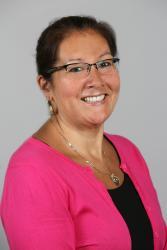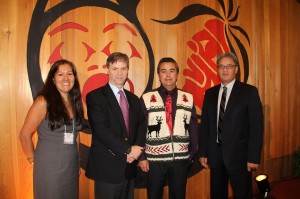
“I always return to the words of Indigenous scholar, Eber Hampton, that we need to design an education system ‘worthy of our ancestors and our children,’” explains Deborah Jeffrey. That ambition drives her in her work as Executive Director of the First Nations Education Steering Committee (FNESC), a community based organization striving to achieve quality First Nations education in BC.
A member of the Tsimshian Nation from northwestern BC, Deborah credits her father and mother for instilling in her the importance of education from an early age and for encouraging her to advance the issues of her people. “My parents had high expectations for me, and like all kids that have high expectations set for them, I tried my best to live up to them.” Her large family, including her two daughters and many nieces and nephews, continue to be a source of encouragement and inspiration.
Deborah graduated in 1983 from UBC with a Bachelor of Education, then served as a teacher and coordinator of First Nations programs and services in the Prince Rupert School District. She returned to SFU to complete her Master of Education Degree from 1997-1999. She took a leave from the School District to assume the role of President of the Tsimshian Tribal Council, working with seven member communities to advance Tsimshian interests. Deborah completed her law degree in 2007 and was called to the bar in 2008. After contributing as a FNESC board member for several years she became FNESC’s Executive Director in 2010.

Today, Deborah works with FNESC’s board of 104 First Nations community representatives, the FNESC Executive, and many partners to advance First Nations education and build a quality BC First Nations education system. This system, developed over the past two decades, includes students in First Nations schools and public schools and a wide-range of second and third-level support services as well as education jurisdiction legislation and the recent Tripartite Education Framework Agreement (TEFA). As a result of TEFA, BC is the only region that funds First Nations schools based on the provincial funding formula with specific adaptations and funding for core and second level supports for First Nations learners.
“My career has always focused on education and it is something that is meaningful to me personally, to my family, and to my community,” says Deborah. “Education is definitely an avenue for opportunity, and FNESC is working to further advance education at all tables – with our partners, with the federal government and provincial government.”
A former high school basketball coach who took great pleasure in organizing tournaments and fundraisers for youth in her community, Deborah has also contributed to a number of committees and boards and she maintains that serving one’s community is an honour and privilege. “Continue your education and use your education to its fullest advantage in terms of doing something you enjoy, but also doing something that helps people,” she advises post-secondary students. “We are all students, whether we are in school or not, and it is important to always broaden your perspective.”
Beyond the Blog
-
Learn more about the work of the First Nations Education Steering Committee












